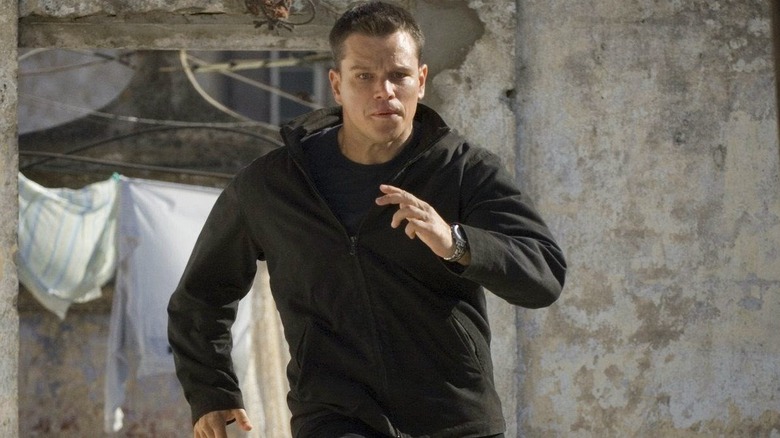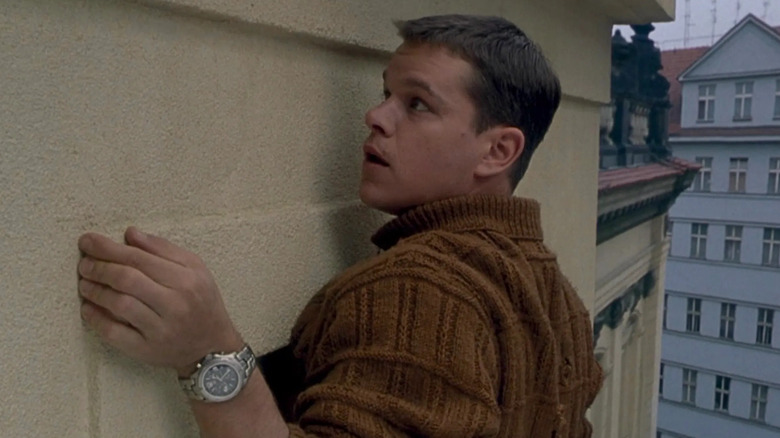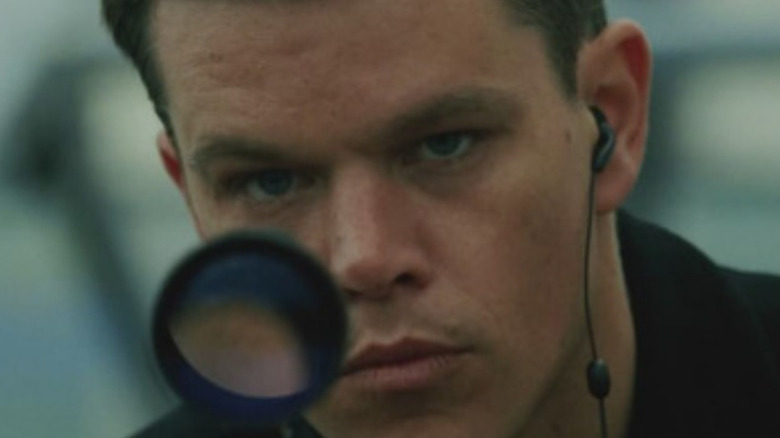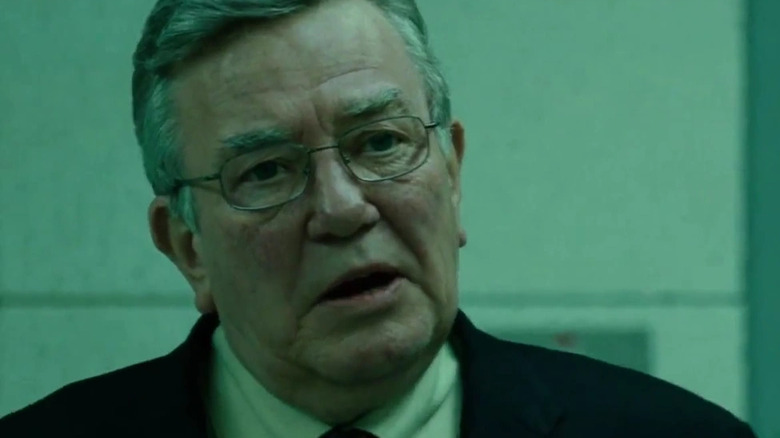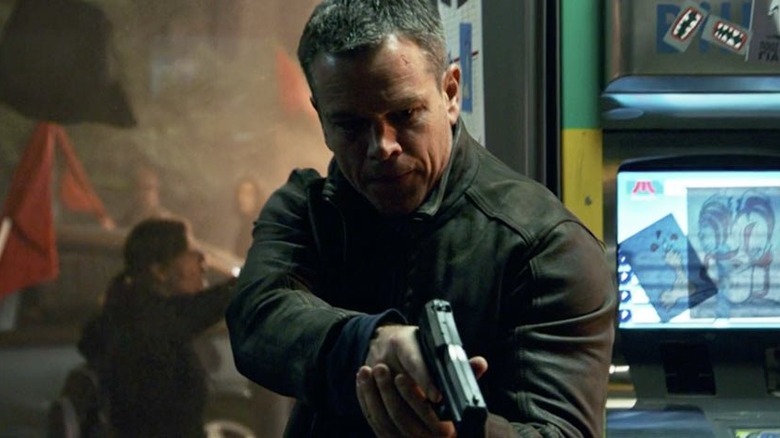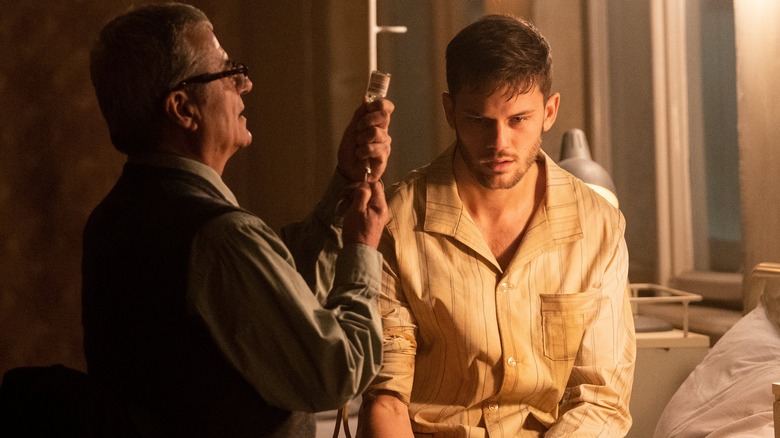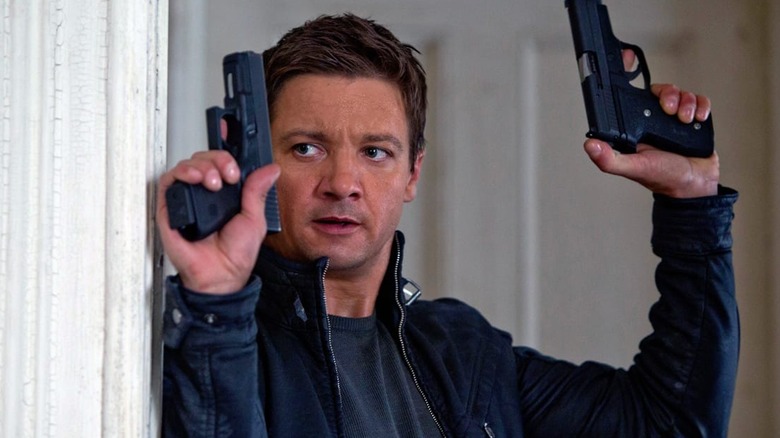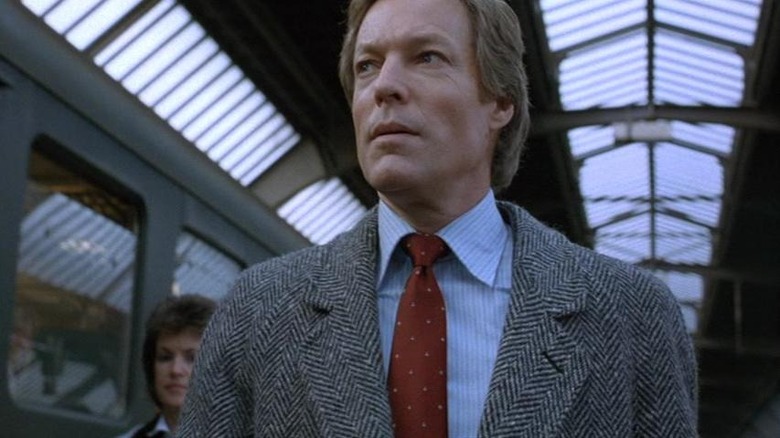The Correct Order In Which To Watch The Bourne Movies And TV Show
He hasn't been around as long as James Bond, but Jason Bourne is quite possibly the second most recognizable name in the world of international espionage. The first Matt Damon-led "Bourne" film hit theaters over 20 years ago, but the "Bourne" films feel every bit as fresh today as they did upon release.
The story of an amnesiac who wakes up filled with bullet holes, only to figure out that he is a super spy, captivated audiences when it first appeared in print in 1980, then again when it finally hit theaters many years later. Author Robert Ludlum followed the character throughout an initial trilogy of novels, all brought to the big screen. The pen was then picked up by author Eric Van Lustbader, who kept the book series going for many years until handing the reins over to Brian Freeman, who has continued writing Bourne novels to this day. The series is up to 18 books now, with the latest installment in Bourne's story hitting shelves in July of 2023.
There have been rumblings and rumors about the "Bourne" movie series making a comeback, but the live-action fate of the franchise is currently up in the air. If Jason Bourne does return from the shadows and back to the bring screen, there is plenty of remaining source material from which to pull, though the movies have already deviated from the plot of the novels quite extensively.
Given that none of the titles are numbered, and all of the plots are dense with information, it's important to know where to start with the "Bourne" series. Here's the ideal order to work your way through them.
1. The Bourne Identity (2002)
The best place to begin is uninitiated, disoriented and trying to catch up — just as Jason Bourne (Matt Damon) finds himself at the outset of "The Bourne Identity."
The first time Damon filled the titular role, working with Doug Liman, the pair crafted a raw, influential spy series that simultaneously harkened back to old-school thrillers like "Three Days of the Condor," "Marathon Man" and "Hopscotch" and lived on the cutting-edge of then-revolutionary techniques like urgent, hand-held shaky cameras ("The Blair Witch Project") and parkour (much of Jackie Chan's catalog). Even the casting of Franka Potente, star of Tom Tykwer's video-game like breakout "Run Lola Run," seemed to signal a new era in blockbuster storytelling. The film became an instant sensation, ranking among the highest-grossing movies of the year.
The overarching storyline begins with a fishing boat finding Bourne floating in the water unconscious and filled with multiple bullet holes. The character's amnesia factors into the entire series, but "The Bourne Identity" is the film that is most focused on his frantic search for answers and path toward rediscovering the elite skillset he contains within him.
People tend to associate the "Bourne" series with shaky camerawork and quick-cut editing, so newcomers to the franchise may be surprised by the visual style of the first film. While there is some handheld camera work and a degree of quick cutting to be found, it was the intent of British filmmaker Paul Greengrass — known for his handheld aesthetic in films like "Bloody Sunday" — to come on with
"The Bourne Supremacy" and make these seeds bloom.
Looking back on the original Liman film, the average shot length is several times longer, and the camera work is far more fluid. Alongside the titular character, "The Bourne Identity" also sets up Nicky Parsons (Julia Stiles), Ward Abbott (Brian Cox), and Bourne's love interest Marie (Franka Potente), all major presences in the films to follow, to varying degrees.
2. The Bourne Supremacy (2004)
"Supremacy" is the second ideal stop on a viewer's journey through the "Bourne" series, and as this progression from "Identity" marks a stylistic shift, it also defines the rest of the series moving forward.
This time around, Tony Gilroy returned to write the adapted screenplay based in part on Robert Ludlum's second "Bourne" novel, and the directing duties changed hands from Liman to Greengrass, who ramped up the shaky camerawork and quick-cut editing to at times disorienting levels, and he would remain in charge for the rest of the Matt Damon "Bourne" films.
Picking up two years after the end of the first movie, "Supremacy" finds Bourne and Marie still on the run until they are inevitably tracked down and thrust back into the dangerous world of assassins, conspiracies, and government agencies. "Supremacy" was the first movie in the series to introduce Pamela Landy (Joan Allen), who would go on to play a vital role in "The Bourne Ultimatum" and "The Bourne Legacy" as well. As is often the case with the middle entries of trilogies (though the "Bourne" series wouldn't remain a trilogy forever), there is a bit of a lull in the momentum of the overarching narrative as "Supremacy" bridges the preceding and following movies together, but there is no shortage of action or thrills.
3. The Bourne Ultimatum (2007)
If "Supremacy" pushed the frantic visual aesthetic a bit too far at times, then "Ultimatum" was able to dial in the stylization and strike a better balance between clarity and haphazard intensity.
When "Ultimatum" hit theaters in 2007, it felt like the impending closure of a trilogy. Of course, the franchise wound up returning after a five-year hiatus, but "Ultimatum" felt like a fitting conclusion at the time. Technically speaking, "Bourne" purists could call it quits here at the end of the first arc and not bother with later installments, which deviate even further from the source material and are generally considered to be significantly lowered in quality, if not altogether dismissible.
"Ultimatum" once again finds Jason Bourne on the run from the CIA and multiple super assassins while also furthering his search for answers about the past, deepening the mysterious back story that has been slowly revealed over the course of three movies. This sequel introduced the important characters of Noah Vosen (David Strathairn) and Dr. Hirsch (Albert Finney), who both return in "The Bourne Legacy."
"Ultimatum" marks either a suitable end to a trilogy or simply the third outing in an ongoing series. If you are thoroughly enjoying your time in the world of international espionage and want to see what else the franchise has to offer, you can press on, though the best approach may be to tackle the remaining films out of order.
4. Jason Bourne (2016)
Though it has the most simplistic and least descriptive title — and, frankly, sounds more like a reboot — "Jason Bourne" is the fifth movie in the "Bourne" series chronologically. However, it is only the fourth movie to star Damon and primarily follow the story of the titular character. Most fans of the "Bourne" series are invested in the journey of Jason Bourne above all else, which is why it makes sense to either skip the diversion that is "The Bourne Legacy" altogether or to at least save it for later. Skipping that Jeremy Renner-fronted fourth movie will have no negative impact on your experience with "Jason Bourne," especially since it mostly takes place in the same timeframe as "The Bourne Ultimatum."
Damon and Greengrass had both opted not to return for the previous movie when Universal was intent on making another sequel, but they changed their tune a few years down the line when it came time to revive the character in "Jason Bourne." Greengrass returned to the director's chair and also co-wrote the screenplay for the first time in the history of the series. Julia Stiles returned as Nicky Parsons, while the rest of the cast was filled with entirely new faces. This time around, the books that previously served as the source material were left entirely by the wayside in favor of a completely original story, which may have been a mistake since "Jason Bourne" was met with the harshest reception from fans and critics alike of any film in the series.
5. Treadstone (2019)
The most recent project in the "Bourne" franchise is also perhaps the least watched. In 2019, "Treadstone" premiered on the USA Network as a television series set in the "Bourne" world. Although Bourne himself never appears, he is discussed, and the series revolves around the same secret government program that turned him into an elite killer.
There is certainly plenty of connective tissue between "Treadstone" and the rest of the franchise, but without the main character and even a single supporting cast member from the movies, it can be easy to forget that "Treadstone" is in a shared universe. The show only ran for 10 episodes before being canceled at the end of its first season, and utilized a split narrative to act as both a sequel and a prequel set in the 1970s, many years before the events of "The Bourne Identity."
Some of the details revealed in the show don't quite line up with, or even outright contradict, answers offered in the movies, making the canon of the series a bit confusing to keep straight.
Though it didn't air until 2019, "Treadstone" was first announced all the way back in 2010. At that point in time, the series was meant to be helmed by Anthony Zuiker of "CSI" fame and would have aired on CBS. Instead, "The Bourne Legacy" took priority, and "Treadstone" was shelved for nearly a decade until being revived by USA under different stewardship.
Taking into account that the show was left open-ended when it was canceled, "Treadstone" is likely only for "Bourne" completionists. Nevertheless, it still feels more like an integral part of the overarching story than the next movie on the list.
6. The Bourne Legacy (2012)
After the massive financial success of the original "Bourne" trilogy, Universal Pictures was eager to keep the series going. Damon and Greengrass were both satisfied with where they had left things off in "Ultimatum," however, and couldn't be convinced to come back for another sequel.
Undeterred, Universal altered course and decided to follow a new character named Aaron Cross (played by Jeremy Renner), while still using the Bourne name to get viewers interested. Jason Bourne only appears in the film through repurposed archival assets, and Renner's Cross is essentially a stand-in, a different assassin with a similar skillset and background. If the spinoff had been a huge success, perhaps "Legacy" could have launched a new series following the Cross character, but a poor reception and weak domestic box office that failed to earn back the film's large budget sent Universal back to the drawing board.
"Legacy" is the clear-cut black sheep of the franchise and does not feel like an essential part of the overarching story. The bulk of the narrative takes place during the timeline of "Ultimatum," while also extending a bit further to make it partially a sequel but primarily an odd side-quel. With little effort to build real attachment to the new Bourne surrogate, the film's stakes feel pretty low and there isn't much to get invested in — and that's without even getting into general missteps like the ridiculous scene where Renner wrestles a wolf.
If you save "The Bourne Legacy" for last and go in with very low expectations, it might do the trick, giving you one last taste of Bourne-flavored shaky-cam action.
7. The Bourne Identity (1988)
It isn't canonical, and Matt Damon was a teenager when it was filmed, but there is one last Jason Bourne project out there that predates all of the others.
The first adaptation of Robert Ludlum's "The Bourne Identity" was released back in 1988, 14 years before the more famous big-screen adaptation. The '88 version aired on ABC as a two-part made-for-TV movie. Today, the project can either be watched as a two-episode mini-series or as a self-contained three-hour-long movie.
The first actor to portray Jason Bourne on screen was Richard Chamberlain. As you can imagine, his interpretation is quite different than Damon's, not least of all because of his age. Damon was in his early 30s when he first played Bourne, but Chamberlain was in his mid-50s, which is actually closer to the age of the character as described in the book.
With an entire extra hour to work with, compared to the 2002 version, the 1988 version is able to include many more plot details from the book that were omitted for the later adaptation. The TV version sticks much closer to the original novel in general, so big fans of Robert Ludlum's source material who want to see an authentic big-screen translation might even prefer this lower-budgeted, less flashy "Bourne" as their go-to adaptation.
